Marchés
Lors de la conception d’une intervention humanitaire et de la prise de décisions quant à l’utilisation des transferts monétaires, l’analyse générale des options de réponse doit inclure une analyse de marché. Il est prouvé qu’offrir un soutien ciblant le fonctionnement des marchés accélère la reprise et accroît la résilience dans les zones affectées par une catastrophe.
De nombreuses organisations ont investi dans la mise au point d’outils visant à faciliter l’analyse de marché et réfléchissent à la mise en place de programmes basés sur les marchés plus holistiques. Elles envisagent des interventions tirant profit du marché (basées notamment sur des transferts monétaires aux populations affectées), ainsi que des interventions soutenant directement les marchés (comme l’octroi de subventions conditionnelles aux vendeurs/euses pour la remise en condition du marché).
Initiatives associées
Contenu associé

1.2 Introduction à l’analyse de marché
Cours
Ce cours de 30 minutes offre une introduction à l’analyse de marché pour les contextes d’urgence. Il contient des contributions d'experts dans ce domaine. Ce cours a été développé en collaboration avec l'International Rescue Committee et le CALP Network et grâce au financement d’USAID/OFDA et de l’Agence Suisse pour le Développement et la Coopération. Il est destiné aux...

2.4 Un guide pratique pour l’analyse de marché
Cours
Ce cours en ligne de 3.5 heures vise à fournir aux équipes qui conduiront des analyses de marchés en contextes humanitaires une compréhension approfondie de la théorie et des étapes à suivre afin de leur permettre de comprendre le pourquoi et le comment du processus à suivre. Les participants seront guides à travers un scenario d'analyse de marchés d'urgence. Ce cours s'appuie sur...
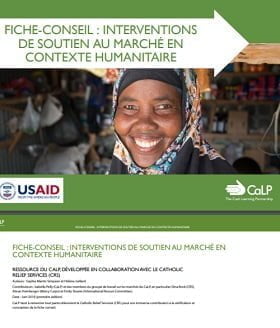
Fiche-Conseil : Interventions de soutien au marché en contexte humanitaire
Guides et outils
La fiche conseil définit le programme de soutien au marché en contexte humanitaire et le décrit dans la pratique. Elle permet aux praticiens humanitaires d’envisager systématiquement des interventions de soutien au marché, parallèlement à d’autres activités du programme. Le champ d’application comprend des interventions de soutien au marché axées sur l’offre/la disponibilité...
Thematic lead
Latest

Impact Evaluation of the Multipurpose Cash Assistance Programme
Report
The Syrian crisis is currently in its sixth year, with over one million Syrians still living in Lebanon as refugees. Nearly 60% of all financial resources pledged by UN agencies and INGOs were to secure basic assistance for Syrian refugees, mainly to support them in meeting food and healthcare needs. In...

Document de travail 2: Étude de cas du Mali. Document préparatoire
Guides et outils
Le présent document vise à fournir un état des lieux des connaissances et des questionnements sur ces questions dans le contexte spécifique du Mali. Il a été écrit sur la base d’une revue documentaire couplée à des échanges menés avec différentes parties prenantes par email et Skype et/ou en...
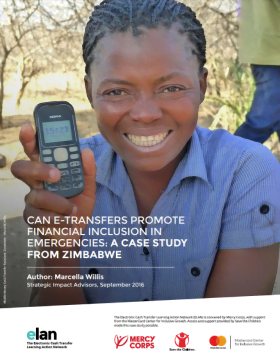
Can E-Transfers Promote Financial Inclusion in Emergencies: A Case Study from Zimbabwe
Case Study
The Electronic Cash Transfer Learning Action Network (ELAN) launched research to build an evidence base around connecting emergency electronic transfer (e-transfer) recipients with additional financial services. They wanted to learn if, when, and how e-transfers can promote sustained uptake and use...

Outil de résilience des transferts monétaires
Guides et outils
L’objectif de l’ORTM est d’aider les organisations humanitaires au niveau national à mieux se préparer aux interventions d’urgence en utilisant les transferts monétaires. Cet outil vise à orienter les organisations humanitaires à pré-positionner les services de transferts monétaires et à...

Economic Impact of Refugee settlements in Uganda
Report
Uganda is home to close to 800,000 refugees, mostly from South Sudan, Burundi and the Democratic Republic of Congo. It also has one of the most favorable and progressive refugee assistance programs in the world, with freedom of movement, work rights, and land officially set aside for refugees to...

Document de travail 3: Protection sociale réactive aux crises dans le Sahel : Perspectives communautaires
Rapport
Il est le troisième rapport d’une série de documents de travail sur la recherche en cours. Ces différents rapports étudient les possibilités d’interaction entre la protection sociale, l’assistance humanitaire et la gestion des risques de catastrophe (GRC) afin de compléter les connaissances...

Giving Better: Lessons from Cash Grants for Syrian Refugees in Lebanon
Report
Cash grants to the poor have proven to be an effective form of aid for reducing poverty. Direct cash assistance is inexpensive to administer and allows recipients to buy what they want and need, rather than what experts think they need. Recent research shows that cash grants also work well for assisting...

Using Cash for Shelter: Rent Assistance for Syrian Refugees
Case Study
Over 600,000 Syrian refugees have arrived in Jordan since 2011; 80 percent of these live in urban or peri-urban locations rather than in camp settings. Families in this situation must pay rent for their shelter, and are therefore subject to shifts in rental market values. Rents have inflated substantially...

Cash Transfers in Humanitarian Contexts
Report
Upon request of the Inter-Agency Standing Committee (IASC) Principals at their meeting on December 11, 2015, the World Bank agreed to coordinate a process of reviewing key issues and options for significantly scaling up the use of multipurpose cash transfers (MPCTs; including digital cash and vouchers) in...
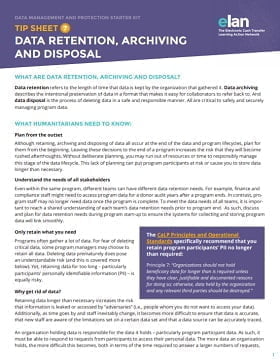
Data management and protection starter kit: Tip sheet 7: Data retention, archiving and disposal
Guidelines and Tools
Data retention refers to the length of time that data is kept by the organization that gathered it. Data archiving describes the intentional preservation of data in a format that makes it easy for collaborators to refer back to. And data disposal is the process of deleting data in a safe and responsible...
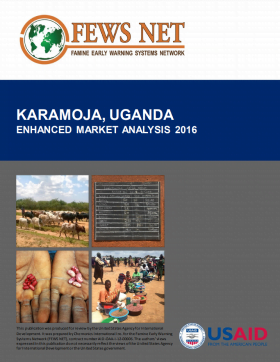
Karamoja, Uganda: Enhanced Market Analysis
Report
The Market Fundamentals reports serves as starting points for providing efficient and effective market-based response decision support for both emergency and development programs in Karamoja Region of Uganda. It examines the appropriateness and feasibility of modality response options for the region.

Pre-Crisis Market Analysis: Credit, Drinking Water and Wheat Flour Market Systems
Report
Mosul, Iraq’s second largest city, was captured by ISIS in June 2014 and remains under their control. The Iraqi army has vowed to recapture Mosul and the speculation is that a counter-offensive is imminent – a military operation which could have dramatic humanitarian implications. A large influx of...

How can lump-sum cash transfers be designed to improve their productive potential?
Presentation
Cash transfer programmes are one of the most popular welfare policies in the developing world and are also backed by a large and rigorous evidence base. Besides the effects on consumption and human capital, the productive impact of cash transfers has been increasingly scrutinised. Despite the fact that...

Rapid Assessment for Markets: Bidibidi Refugee Settlement
Report
The Rapid Assessment of Markets (RAM) conducted within the Bidibidi Refugee Settlement and in the surrounding Ugandan towns and trading centres sheds some light upon the rapidly developing network of marketplaces within one of the world’s fastest growing refugee settlements. The RAM highligthed key...
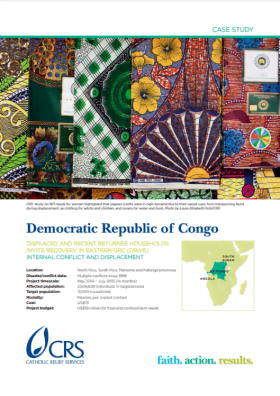
Using Cash for Shelter: Displaced and Recent Returnee Households Invite Recovery in Eastern DRC (DRIVE) Internal Conflict and Displacement
Case Study
The Democratic Republic of Congo, or DRC, has endured multiple conflicts since 1996, including armed conflict in Eastern DRC in 2012 and 2013. In December 2014, the United Nations Office for the Coordination of Humanitarian Affairs in the DRC reported that the armed conflict had internally displaced 2.72...
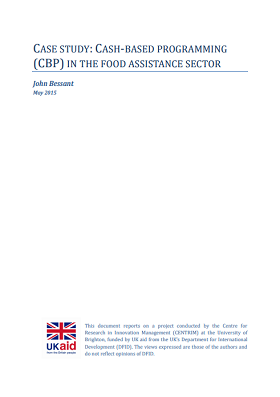
Case Study:Cash-based programming in the food assistance sector
Report
The purpose of this case study is to explore the pattern of innovation in the food supply and distribution area (i.e. not concerned with nutrition). The case raises some key policy issues: How to foster entrepreneurship and create enabling conditions for small-scale experiments and prototypes? How can...
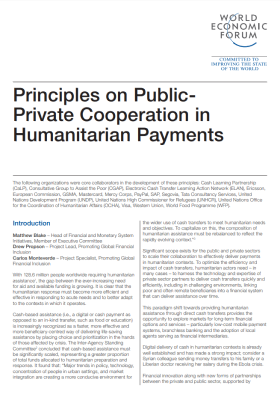
Principles on Public-Private Cooperation in Humanitarian Payments
Guidelines and Tools
E-payments can make the delivery of cash disbursements more secure, cost- effective, faster and more convenient. In the context of humanitarian crises, digital payments offer recipients choice and can help stimulate the local economy. To fully realize the benefits of new technologies and achieve scale,...

Les modèles de coordination des transferts monétaires en Afrique de l’Ouest : Mali et Mauritanie
Rapport
The CALP Network, basé sur son expérience dans les pays et les réalisations des différents groupes – dont la vitalité peut évoluer rapidement au fil des mois – a choisi de documenter particulièrement l’expérience de coordination des TM du Mali, qui est actuellement l’un des CWG les plus...

Literature review on the Use of Cash in Shelter
Report
The Global Shelter Cluster (GSC) with support from UNHCR conducted this literature review of the use of cash in shelter programming to help assess how much documented evidence was currently available from within the sector. The objective of this study is to help better prepare the GSC and its members to...

Can E-transfers Promote Financial Inclusion in Emergencies: A Case Study from Bangladesh
Report
The Electronic Cash Transfer Learning Action Network (ELAN) launched research to build an evidence base around connecting emergency electronic transfer (e-transfer) recipients with additional financial services. They wanted to learn if, when, and how e-transfers can promote sustained uptake and use...
